| Srl | Item |
| 1 |
ID:
088413
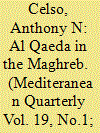

|
|
|
|
|
| Publication |
2008.
|
| Summary/Abstract |
The presence of al Qaeda in the Maghreb (AQIM) may be interpreted as the opening of a new front in the cause of international jihad. However, terrorist activity in North Africa is not new, for the region has been convulsed by past jihadist insurgencies. The essay argues that AQIM is a response to jihadists' post-9/11 organizational and ideological problems. The loss of al Qaeda's Afghan sanctuary had made it dependent on affiliates to recruit terrorists. The failure of the North African Salafists to overthrow any government, moreover, requires the commissioning of a new cause. AQIM is a mutually beneficial arrangement among jihadists to compensate for past failures.
|
|
|
|
|
|
|
|
|
|
|
|
|
|
|
|
| 2 |
ID:
113292
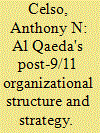

|
|
|
|
|
| Publication |
2012.
|
| Summary/Abstract |
The political transformations under way in the Arab world and the killing of Osama bin Laden raise serious questions about al Qaeda's long-term viability. The secular-liberal Arab Spring protest movement appears to be winning the war of ideas over al Qaeda's violent religious fundamentalism. Civil disobedience campaigns in Tunisia and Egypt succeeded in forcing regime change in ways that a decade of al Qaeda terror attacks failed to accomplish. While it is too soon to write al Qaeda's obituary, its erosion came well before the death of its historic leader. This essay examines al Qaeda's post-9/11 evolution, its strategy, and its steady fragmentation. Since the destruction of its Taliban Afghan sanctuary, al Qaeda has been through many mutations, none of which, over time, has been successful. This essay argues that al Qaeda's failures in Iraq contributed substantially to the organization's decline.
|
|
|
|
|
|
|
|
|
|
|
|
|
|
|
|
| 3 |
ID:
132511
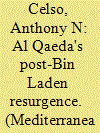

|
|
|
|
|
| Publication |
2014.
|
| Summary/Abstract |
The Barack Obama administration's May 2013 assessment of al Qaeda's weakness and fracturing in the post-bin Laden era has been greeted with indignation by both liberals and conservatives. They believe al Qaeda is stronger than ever in the wake of the Arab Spring. These critics, however, misunderstand the network's dysfunctional direction. Al Qaeda's "resurgence" is likely to lead to its failure. The argument proceeds on four levels: (1) the dramatic growth of the al Qaeda network masks its internal weakness and organizational splintering; (2) the Arab Spring has led to a burst of al Qaeda activism that is likely to undermine its jihadist cause; (3) al Qaeda's fragmentation and its multiple trajectories in the post-9/ 11 era violate bin Laden's original intent and are beyond al Qaeda Central's direction; and (4) the dysfunctional nature of al Qaeda's ideology and its excessive reliance on takfiri violence is paradoxically a source of both persistence and failure.
|
|
|
|
|
|
|
|
|
|
|
|
|
|
|
|
| 4 |
ID:
129908
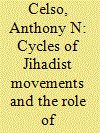

|
|
|
|
|
| Publication |
2014.
|
| Summary/Abstract |
The article argues that Islamist terror is driven by irrational forces; it analyzes jihadist values and doctrines that animate Islamic revolutionaries; it then contends that jihadist movements go through a cycle of mobilization, extremism, implosion and recreation. Finally, it assesses the prospects for jihadist revitalization, extremism, and decline in Syria and the Sahel. Examples from the Iraqi and Algerian jihadist campaigns are used for illustrative purposes throughout.
|
|
|
|
|
|
|
|
|
|
|
|
|
|
|
|
| 5 |
ID:
154171
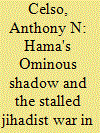

|
|
|
|
|
| Summary/Abstract |
Little has been written about the Syrian Civil War and its relationship to the 1980s revolutionary period. This essay examines this historical connection and emphasizes the unique features that drive the current rebellion. The essay has five sections. First, it lays out the historical roots of the current confessional-political conflict. Second, it provides an overview of the Muslim Brotherhood – led 1979 – 82 rebellion and its defeat in Hama. Third, it discusses the role that the Muslim Brotherhood revolt plays in the current conflict. Fourth, it analyzes jihadist infighting that has weakened the insurgency. Finally, it assesses the role that Russian, Iranian, and Hezbollah intervention has had in bolstering the regime of Bashar al-Assad. Syria's jihadist revolt has limited but important parallels to the failed 1982 Muslim Brotherhood insurrection. Even with the regime's conquest of Aleppo, the Islamist defeat in today's war is far from certain, although the current jihadist insurgency has stalled.
|
|
|
|
|
|
|
|
|
|
|
|
|
|
|
|
| 6 |
ID:
143252


|
|
|
|
|
| Summary/Abstract |
This article contends that takfiri jihadist groups like Boko Haram in Nigeria and the Islamic State exhibit tendencies consistent with Jeffrey Kaplan's fifth wave of terror theory. Beyond placing these groups within Kaplan's framework, this essay also discusses them within the context of takfiri precursors, like the Armed Islamic Group (GIA), Al Qaeda in Iraq (AQI) and Al Qaeda in the Islamic Maghreb (AQIM). Contrary to Kaplan's argument that Islamist groups are not part of the fifth wave, this article concludes that his theory does pertain to takfiri jihadist groups and underscores why this is an important distinction.
|
|
|
|
|
|
|
|
|
|
|
|
|
|
|
|
| 7 |
ID:
148930
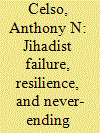

|
|
|
| 8 |
ID:
175724


|
|
|
|
|
| Summary/Abstract |
It has been over a year since the last vestige of Islamic State of Iraq and al-Sham’s (ISIS) caliphate project in the town of Baghuz was captured by American-backed Syrian-Kurdish paramilitary forces. 1 A culmination of four years of bloody warfare between an international coalition of sixty plus nations and ISIS’s global terror network whose size and endurance proved difficult to overcome. Despite the death of some tens of thousands of its fighters and the loss of its transnational state, ISIS remains a potent insurgent-terror movement.
|
|
|
|
|
|
|
|
|
|
|
|
|
|
|
|
| 9 |
ID:
093921
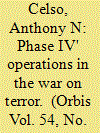

|
|
|
|
|
| Publication |
2010.
|
| Summary/Abstract |
This article identifies the obstacles and prospects of implementing President Obama's surge strategy in Afghanistan by examining four issues: (1) the origins and implementation of the Iraq surge policy; (2) U.S. counterinsurgency operations in Afghanistan; (3) a comparative examination of Afghan and Iraqi tribal insurgent structures; and (4) suggestions for a counter insurgency policy more in sync with regional social and tribal structures.
|
|
|
|
|
|
|
|
|
|
|
|
|
|
|
|
| 10 |
ID:
075461
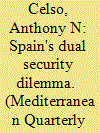

|
|
|
| 11 |
ID:
088399
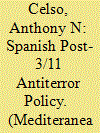

|
|
|
|
|
| Publication |
2009.
|
| Summary/Abstract |
Elected on a platform of withdrawal from Iraq after the 3/11 train bombings, Spanish socialists sought early on to embark on an antiterrorist policy of negotiation and dialogue with disgruntled Arab and Basque communities. The socialists' early efforts at achieving a historic accord with the Basque separatist organization ETA and its willingness to accommodate and integrate North African diaspora communities have floundered. Faced with repeated terrorist attacks and plots, the socialists have reversed course and have moved decisively toward a more draconian law enforcement model in their prosecution of Basque and Islamist militants
|
|
|
|
|
|
|
|
|
|
|
|
|
|
|
|